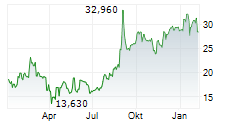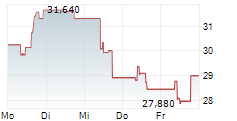
STOCKHOLM, Oct. 31, 2024 /PRNewswire/ -- BioArctic AB's (publ) (NASDAQ Stockholm: BIOA B) partner Eisai has presented the latest findings for lecanemab (Leqembi®) at the Clinical Trials on Alzheimer's Disease, CTAD, congress, held in Madrid, Spain, and virtually, October 29 to November 1. Three-year data show that lecanemab continues to give increased patient benefit for patients with early Alzheimer's disease, expanding approximately 1 point on CDR-SB compared to the ADNI[1]-population, with maintained safety profile. In addition, data show that 46% of patients who had low levels of brain amyloid at the start of treatment have improved or maintained cognition and function after three years of treatment.
Highlights from the presentations at CTAD included:
Benefits of continued treatment with lecanemab for people with early Alzheimer's disease
Results from the open-label long-term extension study (OLE) following the core study of the lecanemab phase 3 Clarity AD study presented at AAIC in July, showed that the mean change from baseline in CDR-SB (global cognitive and functional scale) in the lecanemab treated group was -0.45 at 18 months compared to the placebo group. This had expanded to -0.95 compared to the ADNI-population at 36 months. The data also showed a 30% reduction in the risk of progressing to the next disease stage. Furthermore, the tau PET substudy of Clarity AD showed that with three years of continuous treatment with lecanemab, 59% of patients with no or low tau accumulation in the brain (no tau/low tau) at baseline showed improvement or no decline, and 51% showed improvement from baseline on the Clinical Dementia Rating-Sum of Boxes (CDR-SB) global cognitive and functional scale.
Clarity AD data presented at CTAD expanded on these initial results to include additional measurements resulting from three years of continuous lecanemab treatment in patients with low levels of amyloid accumulation in the brain at baseline (less than 60 centiloids). These data show that 46% of patients improved or had no decline, and 33% showed improvement from baseline on the CDR-SB, with similar results for ADAS-Cog14 and on the ADCS MCI-ADL scales. These results - from no tau/low tau and low amyloid populations - suggest that earlier initiation of lecanemab treatment may have a positive impact on disease progression of early Alzheimer disease patients and may provide continued benefits to these patients over the long term.
Safety matters
No new safety findings were observed with continued lecanemab treatment over three years. Most Amyloid-related imaging abnormalities (ARIA) occurred in the first six months of treatment. After the first six months, ARIA rates were low and similar to ARIA rates on placebo. With regards to the incidence of ARIA by ApoE4 status during the continuous treatment, it was shown that the incidence was higher in ApoE4 homozygotes than in heterozygotes or non-carriers, but rates of new ARIA decreased after the completion of the 18 months core study as treatment continued, regardless of ApoE4 status.
Alzheimer's disease continues to progress when treatment is stopped - continued treatment even after plaque clearance beneficial for patients
Lecanemab continues to positively impact biomarkers over the course of treatment - Clinical data and biomarkers such as Aß42/40 ratio, pTau181, pTau217 and GFAP suggests that AD does not stop progressing after plaque clearance. Data indicates that patients continue to benefit by remaining on treatment, potentially at a lower maintenance dose, which was shown to prevent reaccumulating of brain amyloid and worsening of plasma biomarkers.
Population approved for treatment in Great Britain show greater effect and better safety data
In a presentation of the Clarity AD data focused on the Alzheimer's disease population approved for treatment in Great Britain, ApoE4 heterozygotes or non-carriers, showed that the CDR-SB slowing of decline is greater at 33% compared to the 27% which was seen for the total study population. Simultaneously, the rate of the side effect ARIA-E was lower at 8.9% compared to 12.6% for the total population.
Progress in the AHEAD 3-45 Study - patient enrollment completed
AHEAD 3-45 is a four-year phase 3 clinical study for individuals with preclinical AD, meaning they are clinically unimpaired but have intermediate or elevated levels of amyloid in their brains. Based on the amount of amyloid accumulation in the brain as determined by amyloid PET, subjects were assigned to two (2) trials with different dose settings: the A3 trial (approximately 400 people), for those with intermediate levels of amyloid in the brain, and the A45 trial (approximately 1000 people), for those with increased amyloid levels in the brain. Screening with blood biomarker tests was important to improve eligibility for amyloid PET testing and reduced screening failure on amyloid PET from more than 70% to less than 30%. In particular, plasma p-tau217 was shown to correlate with amyloid PET, supporting its role as a useful blood biomarker to identify elevated amyloid in the brain. Enrollment for the AHEAD 3-45 study was completed in October 2024.
"The long-term data for lecanemab which our partner Eisai has presented are impressive. It shows that the patient benefit of lecanemab continues to increase over time, which is exactly what is expected from a disease modifying treatment. In addition, the safety data reported from clinical practice in the US and Japan seems to be at least on par with phase 3 data," said Gunilla Osswald, CEO at BioArctic. "It is also encouraging to see the results of early Alzheimer disease patients from the low amyloid and no tau/low tau populations, with 46 to 59% showing improvement or no decline compared to baseline at 36 months. This suggest that earlier initiation of lecanemab treatment may have a positive impact on disease progression of early Alzheimer disease patients and could provide continued benefits to patients over the long term."
Lecanemab is the result of a long-standing collaboration between BioArctic and Eisai, and the antibody was originally developed by BioArctic based on the work of Professor Lars Lannfelt and his discovery of the Arctic mutation in Alzheimer's disease. Eisai is responsible for the clinical development, applications for market approval and commercialization of lecanemab for Alzheimer's disease. BioArctic has the right to commercialize lecanemab in the Nordic region and pending European approval Eisai and BioArctic are preparing for a joint commercialization in the region.
The information was released for public disclosure, through the agency of the contact person below, on October 31, 2024, at 08:30 a.m. CET.
For further information, please contact:
Oskar Bosson, VP Communications and IR
E-mail: oskar.bosson@bioarctic.se
Phone: +46 70 410 71 80
About lecanemab (Leqembi®)
Lecanemab is the result of a strategic research alliance between BioArctic and Eisai. It is a humanized immunoglobulin gamma 1 (IgG1) monoclonal antibody directed against aggregated soluble (protofibril) and insoluble forms of amyloid-beta (Aß).
Lecanemab is approved in the U.S., Japan, China, South Korea, Hong Kong, Israel, UAE and Great Britain for the treatment of MCI due to AD and mild AD dementia. Lecanemab's approvals in these countries were primarily based on Phase 3 data from Eisai's global Clarity AD clinical trial, in which it met its primary endpoint and all key secondary endpoints with statistically significant results. The most common adverse events (>10%) in the lecanemab group were infusion reactions, ARIA-H (combined cerebral microhemorrhages, cerebral macrohemorrhages, and superficial siderosis), ARIA-E (edema/effusion), headache, and fall.
Lecanemab marketed in the U.S., Japan and China. Eisai has also submitted applications for approval of lecanemab in 10 countries and regions, including the European Union.
Since July 2020 Eisai's Phase 3 clinical study (AHEAD 3-45) for individuals with preclinical AD, meaning they are clinically normal and have intermediate or elevated levels of amyloid in their brains, is ongoing. AHEAD 3-45 is conducted as a public-private partnership between the Alzheimer's Clinical Trial Consortium that provides the infrastructure for academic clinical trials in AD and related dementias in the U.S, funded by the National Institute on Aging, part of the National Institutes of Health and Eisai. Since January 2022, the Tau NexGen clinical study for Dominantly Inherited AD (DIAD), that is conducted by Dominantly Inherited Alzheimer Network Trials Unit (DIAN-TU), led by Washington University School of Medicine in St. Louis, is ongoing and includes lecanemab as the backbone anti-amyloid therapy.
About the collaboration between BioArctic and Eisai
Since 2005, BioArctic has a long-term collaboration with Eisai regarding the development and commercialization of drugs for the treatment of Alzheimer's disease. The most important agreements are the Development and Commercialization Agreement for the lecanemab antibody, which was signed 2007, and the Development and Commercialization agreement for the antibody Leqembi back-up for Alzheimer's disease, which was signed 2015. In 2014, Eisai and Biogen entered into a joint development and commercialization agreement for lecanemab. Eisai is responsible for the clinical development, application for market approval and commercialization of the products for Alzheimer's disease. BioArctic has the right to commercialize lecanemab in the Nordic region under certain conditions and is currently preparing for commercialization in the Nordics together with Eisai. BioArctic has no development costs for lecanemab in Alzheimer's disease and is entitled to payments in connection with regulatory approvals, and sales milestones as well as royalties on global sales.
About BioArctic AB
BioArctic AB (publ) is a Swedish research-based biopharma company focusing on innovative treatments that can delay or stop the progression of neurodegenerative diseases. The company invented Leqembi® (lecanemab) - the world's first drug proven to slow the progression of the disease and reduce cognitive impairment in early Alzheimer's disease. Leqembi has been developed together with BioArctic's partner Eisai, who are responsible for regulatory interactions and commercialization globally. In addition to Leqembi, BioArctic has a broad research portfolio with antibodies against Parkinson's disease and ALS as well as additional projects against Alzheimer's disease. Several of the projects utilize the company's proprietary BrainTransporter technology, which has the potential to actively transport antibodies across the blood-brain barrier to enhance the efficacy of the treatment. BioArctic's B share (BIOA B) is listed on Nasdaq Stockholm Large Cap. For further information, please visit www.bioarctic.com.
[1] ADNI is a clinical research project launched in 2005 to develop methods to predict the onset of AD and to confirm the effectiveness of treatments. The ADNI observational cohort represents the exact population of those in Clarity AD study; matched ADNI participants show similar degree of decline to placebo group out to 18 months
This information was brought to you by Cision http://news.cision.com
https://news.cision.com/bioarctic/r/lecanemab-data-presented-at-ctad-on-early-initiation-and-long-term-treatment-suggest-increased-patie,c4059313
The following files are available for download:
https://mb.cision.com/Main/9978/4059313/3086574.pdf | Lecanemab data presented at CTAD on early initiation and long-term treatment suggest increased patient benefit with maintained safety profile |
![]() View original content:https://www.prnewswire.co.uk/news-releases/lecanemab-data-presented-at-ctad-on-early-initiation-and-long-term-treatment-suggest-increased-patient-benefit-with-maintained-safety-profile-302292627.html
View original content:https://www.prnewswire.co.uk/news-releases/lecanemab-data-presented-at-ctad-on-early-initiation-and-long-term-treatment-suggest-increased-patient-benefit-with-maintained-safety-profile-302292627.html





